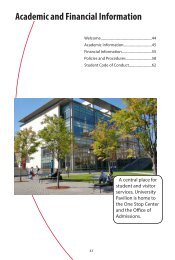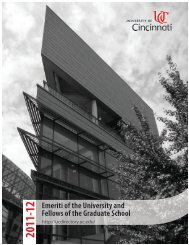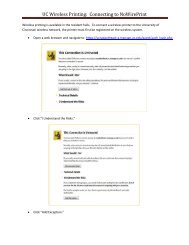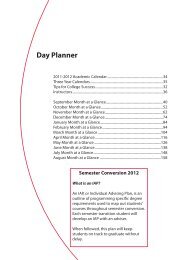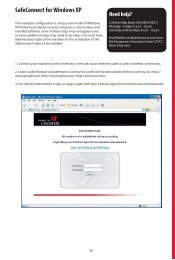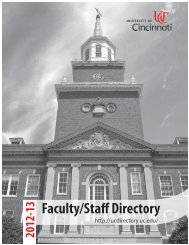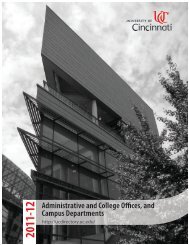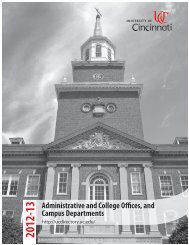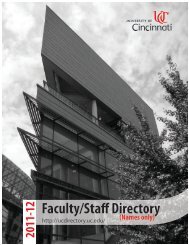IT Handbook - Directories - University of Cincinnati
IT Handbook - Directories - University of Cincinnati
IT Handbook - Directories - University of Cincinnati
Create successful ePaper yourself
Turn your PDF publications into a flip-book with our unique Google optimized e-Paper software.
Who Can Help?<br />
You can get help from one <strong>of</strong> these <strong>of</strong>fices or departments if you become a victim through affiliation with a<br />
social web site.<br />
Counseling Center.................................................... 513-556-0648<br />
Office <strong>of</strong> Student Life............................................... 513-556-5250<br />
Resident Education and Development.............. 513-556-6476<br />
UC 24-Hour Sexual Violence Crisis Line............. 513-218-9531<br />
UC Ombuds Office..................................................... 513-556-5956<br />
UC Police Department............................................. 513-556-1111 or 911 (Emergencies)<br />
UC Women’s Center................................................... 513-556-4401<br />
UCit Information Security........................................ 513-558-4732<br />
<strong>University</strong> Judicial Affairs........................................ 513-556-6814<br />
Peer-To-Peer (P2P) File Sharing<br />
Unauthorized peer-to-peer (P2P) file sharing on college and university campuses is receiving increasing<br />
attention from the entertainment industry, the media, and the United States Congress. Although P2P file<br />
sharing on university networks is not unlawful, such activity could be harmful especially as it can lead to<br />
a violation <strong>of</strong> the federal copyright law. Indeed, many students using popular s<strong>of</strong>tware such as Limewire,<br />
Frostwire, uTorrent, and Gnutella, intentionally or advertently infringe on copyrighted works relating to<br />
music, movies, computer s<strong>of</strong>tware, video games, and photographs. Lawsuit filings indicate copyright<br />
owners are taking the <strong>of</strong>fensive against infringements on their protected works. Students need to know<br />
their rights and responsibilities, and their potential liability for unlawful P2P activities.<br />
The basis for copyright law is found in Article 1 <strong>of</strong> the United States Constitution and codified in Title<br />
17 (the “Copyright Act”) <strong>of</strong> the United States Code. The Copyright Act lists exclusive rights <strong>of</strong> copyright<br />
holders, including reproduction and distribution <strong>of</strong> the copyrighted work, both <strong>of</strong> which are implicated in<br />
P2P file sharing. There are three types <strong>of</strong> infringement: direct, contributory, and vicarious. Under direct<br />
infringement, a person is liable for his or her own infringing conduct; under contributory infringement,<br />
a person may be liable if he or she knows <strong>of</strong> the infringing activity, and induces, causes, or materially<br />
contributes to the infringing conduct <strong>of</strong> another; under vicarious infringement, a person may be liable if he<br />
or she has the right and ability to supervise the infringing activity and also has a direct financial interest in<br />
the activity. Most users <strong>of</strong> P2P networks fall under the direct infringement category. However, even without<br />
directly infringing conduct, students who operate or encourage the use <strong>of</strong> such networks may be open to<br />
contributory or vicarious claims.<br />
Downloading, possessing or distributing copyrighted material without the owners’ permission is also a<br />
violation <strong>of</strong> the <strong>University</strong>’s General Policy on the Use <strong>of</strong> Information Technology (http://www.uc.edu/ucit/).<br />
The <strong>University</strong> <strong>of</strong> <strong>Cincinnati</strong> does not actively monitor illicit or inappropriate activities, nor is it under any<br />
obligation to defend or accept responsibility for its students’ illegal actions in the P2P context.<br />
The <strong>University</strong> <strong>of</strong> <strong>Cincinnati</strong> expects our user community to act in a proper and responsible computing<br />
manner. If illegal or inappropriate activities are brought to our attention, the <strong>University</strong> will take all<br />
reasonable and appropriate actions. Copyright violations will generate a report to the <strong>of</strong>fice <strong>of</strong> Student Life-<br />
<strong>University</strong> Judicial Affairs as part <strong>of</strong> the <strong>University</strong>’s disciplinary action process. This can result in a variety <strong>of</strong><br />
actions including removal <strong>of</strong> computer privileges and probation. Additionally, the copyright holder <strong>of</strong> the<br />
material found on your system may take legal action against violators.<br />
What can you do to be part <strong>of</strong> the solution? Avoid downloading, distributing, or possessing copyrighted<br />
material over the Internet and the UC internal network unless you have received explicit permission from<br />
the owner, their <strong>of</strong>ficial representative, or have paid an access or license fee to obtain the material. If you<br />
are using a peer-to-peer application you should consider removing it from your system prior to connecting<br />
to the <strong>University</strong>’s network. If you do not remove the application, you should ensure your system is set to<br />
prevent the application from acting as a provider <strong>of</strong> unlicensed materials to other users. Failure to restrict<br />
the application, whether you are aware <strong>of</strong> the violation or not, will result in the <strong>University</strong>’s Information<br />
Technology department (UC<strong>IT</strong>) removing your machine from the network until the copyright violation is<br />
rectified.<br />
80



